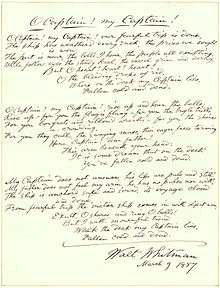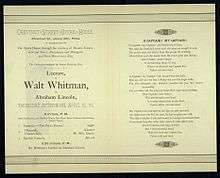O Captain! My Captain!
"O Captain! My Captain!" is an extended metaphor poem written in 1865 by Walt Whitman about the death of American president Abraham Lincoln.[1]
| by Walt Whitman | |
 Printed copy of "O Captain! My Captain!" with revision notes by Whitman, 1888[1] | |
| Written | 1865 |
|---|---|
| First published in | Sequel to Drum-Taps |
| Subject(s) | Abraham Lincoln, American Civil War |
| Form | Elegy, ode, extended metaphor |
| Read online | "O Captain! My Captain" at Wikisource |
Emphasizing grief and sorrow, the poem was first published in the pamphlet Sequel to Drum-Taps alongside another Lincoln elegy—"When Lilacs Last in the Dooryard Bloom'd"—and 16 other poems by Whitman regarding the American Civil War. It was later included in Whitman's comprehensive collection Leaves of Grass, beginning with its fourth edition published in 1867.
Text

O Captain! My Captain! our fearful trip is done;
The ship has weather'd every rack, the prize we sought is won;
The port is near, the bells I hear, the people all exulting,
While follow eyes the steady keel, the vessel grim and daring:
But O heart! heart! heart!
O the bleeding drops of red,
Where on the deck my Captain lies,
Fallen cold and dead.
O Captain! My Captain! rise up and hear the bells;
Rise up—for you the flag is flung—for you the bugle trills;
For you bouquets and ribbon'd wreaths—for you the shores a-crowding;
For you they call, the swaying mass, their eager faces turning;
Here captain! dear father!
This arm beneath your head;
It is some dream that on the deck,
You've fallen cold and dead.
My Captain does not answer, his lips are pale and still;
My father does not feel my arm, he has no pulse nor will;
The ship is anchor'd safe and sound, its voyage closed and done;
From fearful trip, the victor ship, comes in with object won;
Exult, O shores, and ring, O bells!
But I, with mournful tread,
Walk the deck my captain lies,
Fallen cold and dead.
Background

Walt Whitman composed "O Captain! My Captain!" in 1865 after the assassination of Abraham Lincoln, the 16th president of the United States. Written to honor Lincoln, the poem has been classified as an elegy, or mourning poem.
Born in 1819 and died in 1892, the American Civil War was the central event of Whitman's life, during which he was a staunch Unionist. Though initially indifferent to Lincoln, Whitman came to love the president as the war pressed on; however, the two men never met.[2]
"O Captain! My Captain!" became one of Whitman's most famous poems, one that he would read at the end of his famous lecture on Lincoln's assassination. Whitman became so identified with the poem that late in life he remarked, "Damn My Captain...I'm almost sorry I ever wrote the poem."[3]
In popular culture
A musical version of the poem appears on Carolyn Hester's 1965 live album At Town Hall.[4]
The song, translated into Hebrew by Naomi Shemer, was set to music and performed by Israeli singer Meital Trabelsi in a television special that aired on the first anniversary of the assassination of Israeli Prime Minister Yitzhak Rabin. In Israel, this rendition has been associated with the event ever since.[5]
The poem gained newfound recognition in pop culture for its significance in the 1989 film Dead Poets Society, starring Robin Williams,[6] especially due to a scene in its final act.[7] After Williams' death in August 2014, fans of his work used social media to pay tribute to him with photo and video reenactments of the film's famous "O Captain! My Captain!" scene.[8]
See also
- Abraham Lincoln cultural depictions
References
- "Image 2 of Walt Whitman Papers: Literary file; Poetry; O Captain! My Captain! printed copy with corrections, 1888," Walt Whitman papers. US: Library of Congress, Manuscript Division.
- Peck, Garrett (2015). Walt Whitman in Washington, D.C.: The Civil War and America's Great Poet. Charleston, SC: The History Press. p. 85. ISBN 978-1626199736.
- Peck 2015, p. 120.
- Planer, Lindsay. Carolyn Hester At Town Hall at AllMusic. Retrieved April 16, 2014.
- מיטל טרבלסי הו רב חובל [Meital Trabelsi Oh Captain] on YouTube.
- Goodman, Jessica. 11 August 2014. "Robin Williams And The 'O Captain' Scene That Inspired A Generation." HuffPost.
- O Captain, my Captain! | Thank you to Robin Williams (HD) on YouTube.
- Idato, Michael (14 August 2014). "Robin Williams death: Jimmy Fallon fights tears, pays tribute with 'Oh Captain, My Captain'". The Sydney Morning Herald. Retrieved 2014-11-15.
External links
| Wikisource has original text related to this article: |
